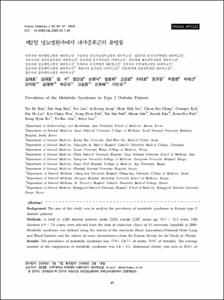KUMEL Repository
1. Journal Papers (연구논문)
1. School of Medicine (의과대학)
Dept. of Internal Medicine (내과학)
제2형 당뇨병환자에서 대사증후군의 유병률
- Keimyung Author(s)
- Park, Keun Gyu
- Department
- Dept. of Internal Medicine (내과학)
- Journal Title
- Korean Diabetes Journal
- Issued Date
- 2009
- Volume
- 33
- Issue
- 1
- Keyword
- Diabetes mellitus; Metabolic syndrome; Obesity
- Abstract
- Background: The aim of this study was to analyze the prevalence of metabolic syndrome in Korean type 2 diabetic patients. Methods: A total of 4,240 diabetic patients (male 2,033, female 2,207; mean age 58.7 ± 11.3 years; DM duration 8.9 ± 7.6 years) were selected from the data of endocrine clinics of 13 university hospitals in 2006. Metabolic syndrome was defined using the criteria of the American Heart Association/National Heart Lung and Blood Institute and the criteria of waist circumference from the Korean Society for the Study of Obesity.
Results: The prevalence of metabolic syndrome was 77.9% (76.7% of males, 78.9% of females). The average number of the components of metabolic syndrome was 2.4 ± 1.1. Abdominal obesity was seen in 56.8% of the patients, hypertriglyceridemia in 42.0%, low HDL cholesterol in 65.1%, and high blood pressure in 74.9%. Abdominal obesity and high blood pressure were much more prevalent among females than males, and low HDL cholesterol was much more prevalent among males than females. The prevalence of metabolic syndrome was not different according to the duration of diabetes. Metabolic syndrome was strongly related with obesity (odds ratio, 6.3) and increased age (odds ratio in the over 70 group, 3.4). Conclusion: The prevalence of metabolic syndrome was 77.9% in Korean type 2 diabetic patients. Its prevalence was greater in obese patients and in those over 40 years of age.
연구배경: 국내 제2형 당뇨병환자에서의 대사증후군 유병률에 대한 보고가 많지 않았다. 본 연구는 최근 대학병원에서 진료중인 제2형 당뇨병환자를 대상으로 대사증후군의 유병률과 관련된 인자를 알아보고자 하였다. 방법: 2006년 국내 대학병원 13개 기관의 내분비내과를 방문한 제2형 당뇨병환자 4,240명(남성 2,033명, 여성 2,207명, 평균연령 58.7 ± 11.3세, 당뇨병의 이환기간 8.9 ± 7.6년)을 대상으로 2005년 발표된 AHA/NHLBI의 대사증후군 진단기준과 대한비만학회에서 제시한 복부비만(허리둘레) 기준을 적용하여 대사증후군으로 정의하였다. 결과: 대상 환자의 77.9%가 대사증후군을 동반하였고, 남성(76.7%)에 비해 여성(78.9%)에서 대사증후군의 유병률이 약간 높았으나 연령을 보정한 후 차이는 없었다. 대사증후군의 구성요소 개수의 평균은 2.4 (± 1.1)개 이었다. 대사 증후군의 구성요소 각각의 유병률은 복부비만 56.8%, 고중성지방혈증 42.0%, 저고밀도지단백 콜레스테롤혈증 65.1%, 고혈압 74.9%로 나타나 고혈압이 가장 흔하였다. 복부비만과 고혈압은 여성에서 남성보다 높은 빈도를 보였고, 저고 밀도지단백 콜레스테롤혈증은 남성에서 더 높게 나타났다. 대사증후군은 나이가 증가함에 따라 증가하며, 특히 여자에서 뚜렷한 증가를 보였다. 한편 당뇨병 이환기간에 따른 대사증후군 유병률은 차이가 없었다. 대사증후군의 동반을 결정하는 인자를 알기 위해 다중로지스틱회귀분석을 시행한 결과 전신비만이 동반된 경우 6.3배, 나이가 증가할수록, 구체적으로 40대 1.5배, 50대 1.5배, 60대 2.2배, 70대 이상 3.4배 높은 것으로 나타났다. 결론: 한국인 제2형 당뇨병환자에서 대사증후군은 77.9% 이었고, 대사증후군은 비만이 있고, 나이가 40대 이상일수록 높은 것으로 나타났다.
- Alternative Title
- Prevalence of the Metabolic Syndrome in Type 2 Diabetic Patients
- Keimyung Author(s)(Kor)
- 박근규
- Publisher
- School of Medicine
- Citation
- 김태호 et al. (2009). 제2형 당뇨병환자에서 대사증후군의 유병률. Korean Diabetes Journal, 33(1), 40–47. doi: 10.4093/kdj.2009.33.1.40
- Type
- Article
- ISSN
- 1976-9180
- Appears in Collections:
- 1. School of Medicine (의과대학) > Dept. of Internal Medicine (내과학)
- 파일 목록
-
-
Download
 oak-aaa-03322.pdf
기타 데이터 / 320.5 kB / Adobe PDF
oak-aaa-03322.pdf
기타 데이터 / 320.5 kB / Adobe PDF
-
Items in Repository are protected by copyright, with all rights reserved, unless otherwise indicated.